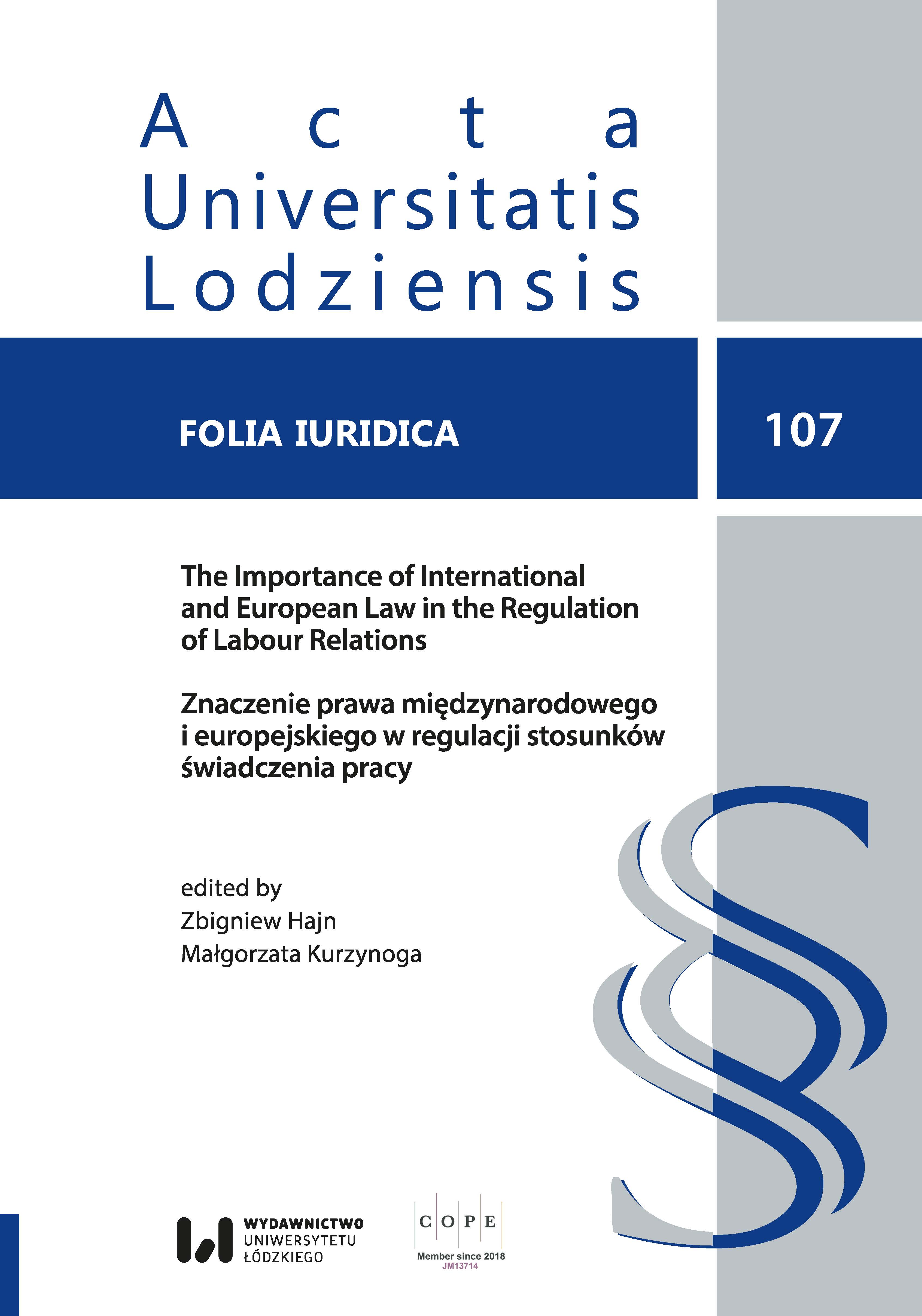Big data analytics w zarządzaniu algorytmicznym: studium przypadku platform transportowych w ekonomii współdzielenia
DOI:
https://doi.org/10.18778/0208-6069.107.02Słowa kluczowe:
Big data, zarządzanie algorytmiczne, kapitalizm nadzoru, platformy transportowe, uczenie maszynoweAbstrakt
W artykule omówiono wpływ modeli biznesowych ekonomii gig na prywatność, szczególnie w kontekście platform transportowych, takich jak Bolt, Uber czy Deliveroo. Centralnym elementem jest zarządzanie algorytmiczne, które polega na automatyzacji decyzji i nadzorze miejsc pracy przy użyciu ogromnych ilości danych do szkolenia algorytmów uczących się maszynowo. Podkreślono, że dane stały się strategicznym zasobem ekonomicznym, prowadzącym do naruszeń praw do prywatności z uwagi na akumulację danych i asymetrię informacji. Profesor Shoshana Zuboff nazwała to zjawisko „kapitalizmem nadzoru”, gdzie prywatność staje się surowcem do produkcji danych behawioralnych. Artykuł zwraca uwagę na potrzebę znalezienia równowagi między wykorzystaniem danych przez sztuczną inteligencję a ochroną praw do prywatności, podkreślając znaczenie przejrzystości w praktykach zbierania i przetwarzania danych. Autor proponuje czteroetapowy proces zapewniający ochronę prywatności pracowników na platformach transportowych, zgodnie z międzynarodowymi standardami. Zostaje również poruszona kwestia wpływu systemów decyzyjnych opartych na AI na autonomię i prywatność pracowników, wzywając do opracowania optymalnych mechanizmów prawnych do oceny danych behawioralnych.
Pobrania
Bibliografia
AIDA. 2022. Special Committee on Artificial Intelligence in a Digital Age.
Google Scholar
Baiocco, Sara. Enrique Fernandez-Macías. Uma Rani. Annarosa Pesole. 2022. The Algorithmic Management of work and its implications in different contexts. ILO.
Google Scholar
Bygrave, Lee A. 2020. “The ‘Strasbourg Effect’ on Data Protection in Light of the ‘Brussels Effect’: Logic, Mechanics and Prospects.” Computer Law & Security Review 40.
Google Scholar
CAIDP. 2021. Artificial Intelligence and Democratic Values. Washington, DC: Center for AI and Digital Policy.
Google Scholar
Cansu, Safak. James Farrar. 2021. Managed by Bots. Data-Driven Exploitation in the Gig Economy. Worker Info Exchange.
Google Scholar
Cram, W. Alec. Martin Wienerb. Monideepa Tarafdarc. Alexander Benlian. 2022. “Examining the Impact of Algorithmic Control on Uber Drivers’ Technostress.” Journal of Management Information Systems 39(2): 426–453.
Google Scholar
Duggan, James. Ultan Sherman, Ronan Carbery. Anthony McDonnell. 2020. “Algorithmic management and app-work in the gig economy: A research agenda for employment relations and HRM.” Human Resource Management Journal: 114–132.
Google Scholar
Ebert, Isabel. Isabelle Wildhaber. Jeremias Adams-Prassl. 2021. “Big Data in the workplace: Privacy Due Diligence as a human rights-based approach to employee privacy protection.” Big Data&Society 8(1).
Google Scholar
European Commission. 2021. Questions and answers: Improving working conditions in platform work. https://ec.europa.eu/commission/presscorner/api/files/document/print/en/qanda_21_6606/ (accessed: 25.07.2023).
Google Scholar
Fina, Valentina Della. Rachele Cera. Giuseppe Palmisano. 2017. The United Nations Convention on the Rights of Persons with Disabilities. A Commentary. Cham: Springer.
Google Scholar
FRA. 2010. “Data Protection in the European Union: the role of National Data Protection Authorities. Strengthening the fundamental rights architecture in the EU II.” Publications Office of the European Union: 1–56.
Google Scholar
Gillespie, Tarleton. 2014. “The Relevance of Algorithms.” In Media Technologies: Essays on Communication, Materiality, and Society. 167–193. Ed. by Tarleton Gillespie, Pablo J. Boczkowski, Kirsten A. Foot. Cambridge: MIT Press Scholarship.
Google Scholar
GPA. 2020. “Policy Strategy Working Group 1: Global Frameworks and Standards.”
Google Scholar
Hendrickx, Frank. 2022. “Protection of workers’ personal data: General principles.” ILO Working paper 62.
Google Scholar
Hong, Renyi. 2016. “Soft skills and hard numbers: Gender discourse in human resources.” Big Data & Society 3(2).
Google Scholar
Koops, Bert-Jaap. Ronald Leenes. 2014. “Privacy regulation cannot be hardcoded. A critical comment on the ‘privacy by design’ provision in data-protection law”. International Review of Law, Computers & Technology 28(2): 159–171 .
Google Scholar
Lee, Min Kyung. Daniel Kusbit. Evan Metsky. Laura Dabbish. 2015. “Working with Machines: The Impact of Algorithmic and Data-Driven Management on Human Workers.” In CHI ‘15: Proceedings of the 33rd Annual ACM Conference on Human Factors in Computing Systems. 1603–1612. New York, NY: Association for Computing Machinery.
Google Scholar
Madinier, Franca Salis. 2022. “A guide to Artificial Intelligence at the workplace.” European Economic and Social Committee.
Google Scholar
Mateescu, Alexandra. Aiha Nguyen. 2019. “Algorithmic Management in the Workplace.” Data&Society.
Google Scholar
Monnheimer, Maria. 2021. Due Diligence Obligations in International Human Rights Law. Cambridge: Cambridge University Press.
Google Scholar
Montaudon Tomas, Cynthia Maria. Ingrid N. Pinto-Lóp. Anna Amsler. 2022. “Discussions on How to Best Prepare Students on the Ethics of Human-Machine Interactions at Work.” In Applied Ethics in a Digital World. 216–237. Ed. by Ingrid Vasiliu-Feltes, Jane Thomason. Hershey, PA: IGI Global.
Google Scholar
Nowik, Paweł. 2021. “Electronic personhood for artificial intelligence in the workplace.” Computer Law & Security Review 42.
Google Scholar
Rahul, Rai. Murali Shruti Aji. 2020. Global standards on AI. A report on global legislation & policy positions governing AI technology. INDI/ai,
Google Scholar
Rosenblat, Alex. Luke Stark. 2016. “Algorithmic Labor and Information Asymmetries: A Case Study of Uber’s Drivers.” International Journal of Communication 30(7): 3758–3784.
Google Scholar
UN Working Group. 2023. https://www.business-humanrights.org/en/big-issues/un-working-group/ (accessed: 15.07.2023).
Google Scholar
Walker, Michael. Peter Fleming. Marco Berti. 2021. “You can’t pick up a phone and talk to someone: How algorithms function as biopower in the gig economy.” Organization, 26–43.
Google Scholar
Zuboff, Shoshana. 2019. Wiek kapitalizmu inwigilacji. Walka o przyszłość ludzkości na nowej granicy władzy. Warszawa: Zysk i S-ka.
Google Scholar
Pobrania
Opublikowane
Wersje
- 2024-08-06 - (2)
- 2024-06-30 - (1)
Jak cytować
Licencja

Utwór dostępny jest na licencji Creative Commons Uznanie autorstwa – Użycie niekomercyjne – Bez utworów zależnych 4.0 Międzynarodowe.














